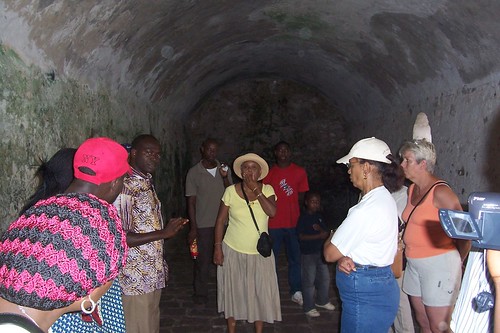This time it became even more personal. We visited only Elmina Castle, built in 1482 by the Portuguese. Initially the main booty was gold from the Gold Coast, acquired in trade for guns. The warehouses held the gold as well as cloths, blankets and linen from Morocco. The fortress was built to protect their bounty from traders and pirates from other countries. Then the price of gold slumped, and they found that it was more lucrative to trade in humans.
This time, as our guide described the female slave dungeon so vividly, the hundreds of bodies in that small space, in the dark, with no toilet, the smells of urine, and feces, and blood, and tears, I was there. I was there surrounded by bodies of other women who did not speak my same language, did not come from my village, and I was alone. I could hear my mother's voice singing that song she always sang.
Mother died when I was twelve years old. She died of breast cancer after four years of being in and out of the hospital, for double mastectomies, and radiation therapy. Chemotherapy wasn't widely available back then. Sometimes when she had a good day, she and my sisters and I would all be in the kitchen cooking. When Mother was busy at the sink washing vegetables, or at the table stirring up something, she would sing. Her song was always the same, Sometimes I feel like a Motherless child, a long way from home. She would sing softly to herself, moaning and swaying.
I never heard first-hand the stories of my grandmother and her Mother. These became the stuff of family reunions after Mother died, when I learned that my grandmother, Mattie had lost her mother in childbirth. Mattie had been raised by a series of stepmothers who never treated her as part of the family. There was so much pain wrapped up in that one song, the pain of not being wanted, pain of being alone, and pain of never knowing that you are loved.
There I stood in that dungeon, with the other tourists, but alone with that primeval pain, moaning and swaying.


